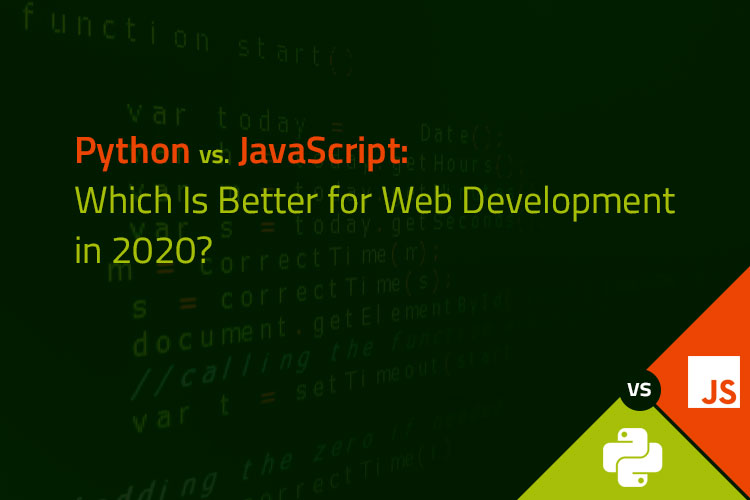Python vs. JavaScript: Which Is Better for Web Development in 2020?
Constant evolution and progress are the underlying constants of the modern era. We live in a technologically enhanced era where everything undergoes massive progress within a matter of months. From Python web development services to JavaScript libraries, everything evolves over time. It is time to have an epic showdown between Python and JavaScript and see which one comes out as the best web development language for 2020.
We have all come across the excruciating choice of having to choose between different frameworks and languages for the next project. Well, since Python and JavaScript are among the top languages right now. Let’s take a look and see which one is better for web development practices in 2020.
Python vs. JavaScript: The Showdown
Every Python Django development company will tell you that Python and JavaScript have been the talk of the town for the second half of this decade. However, both of these giants come with their own pros and cons, and it is time to put them to the test.
The Requirement for an Interpreter
Python requires an interpreter to write and execute the files. The interpreter can easily be downloaded and installed from the official websites, but the files cannot run without it.
JavaScript does not need an interpreter to run the files. It simply uses the native browser to compile and execute the files.
JavaScript Wins.
Versatility
Python is generally considered to be among the most powerful and versatile languages of this decade. This 23-years old dynamic language offers ultimate scalability, integration, and versatility. Therefore, thousands of programmers use Python for AI/MI and Python web development services.
JavaScript is also considered quite good when it comes to versatility. However, JavaScript does not offer much in terms of Artificial Intelligence, deep learning, and machine learning. This is why JS loses to Python in versatility.
Python Wins.
Associative Lists and Dictionaries
Python offers the option of creating associative lists. You may also refer to these lists as dictionaries. Basically, Python can create, retain, and maintain runtime lists to offer better engagement and user experience. These lists may include favorite words, frequently used key functions, passwords, and other credentials.
JavaScript does offer arrays, but it does not offer associative arrays or lists. This means that you cannot store data in associative lists, and you will have to create a new object every time. Not only does this utilize more RAM, but it also slows down the process.
Python Wins.
Modules
Python is often referred to as a battery included language because it offers you a wide range of pre-built modules. A Python Django Development Company often repurposed the majority of these modules for its unique requirements.
On the other hand, JS comes with a limited amount of modules that can be reused for web development services. The programmers will almost always have to create their own functions and modules or rely on risky third-party modules.
Python Wins.
Defining Properties and Attributes
In Python, you can use the descriptor protocol, such as getter and setter functions, to set the values of attributes and properties for any object. This is quite an easy thing, and the majority of programmers are already familiar with this type of value setting function.
In JavaScript, objects have properties that consist of underlying attributes. So, you cannot directly define a property but can set the value of an attribute, creating that property for you. This method is a little complicated than a simple descriptor protocol.
Python Wins.
What Are the Pros and Cons of Python and JavaScript?
Python web development services are getting immensely popular in recent days, and there is a reason for that. JavaScript used to be the uncrowned king for web development, but Python took that away from JS. Let’s take a look at their individual pros and cons to make a well-informed decision.
JavaScript
|
Pros |
Cons |
|
Fast Speed |
No Client-Side Security |
|
Simple |
Old Browsers Don’t Support |
|
Only Needs Browser To Run |
Minimal Debugging |
|
Popular |
|
|
Easily Embedded Into Other Languages |
|
|
Can Take High Server Load |
|
|
Rich Interfaces |
|
|
Smaller Overhead |
|
Python
|
Pros |
Cons |
|
Object-Oriented |
Speed Limitations |
|
Easy-To-Learn |
Slow Mobile Interfaces |
|
A Multitude Of Pre-Built Libraries |
Lack Of Design Freedom |
|
Rich Modules |
|
|
Easily Embedded Into Other Languages |
|
|
Heightened Productivity |
|
|
Rich Debugging Features |
|
|
IOT Compatible |
|
|
Easily Readable |
|
|
Free And Open Source |
|
The Verdict
We at Sofvare will recommend Python for your future endeavors. Python is scalable, easily understandable, and offers rich debugging features. Contact Sofvare for your Python coding and development needs. We have highly experienced and senior developers on our team, ready to start your project today.

